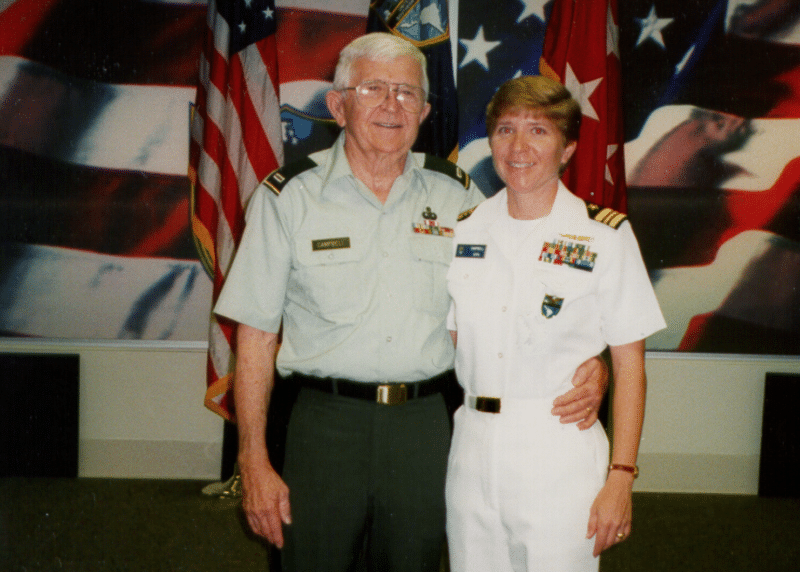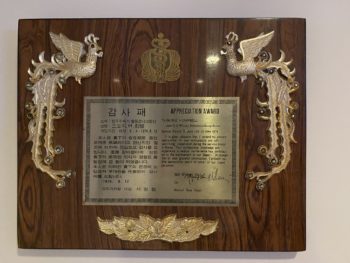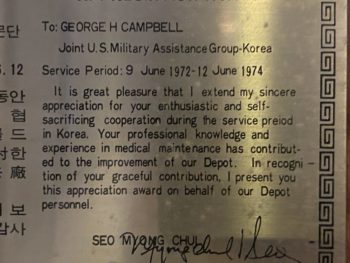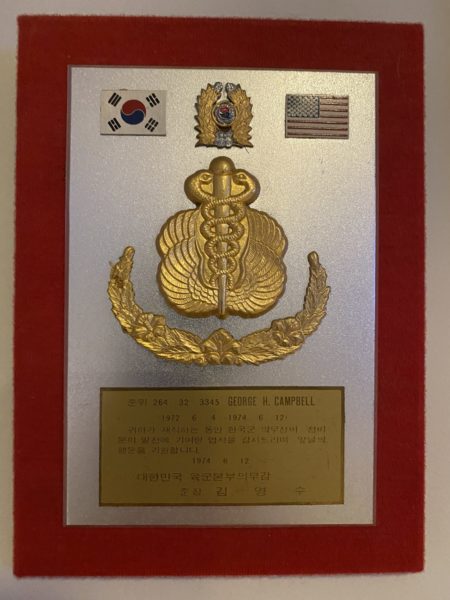NEWS
How the Response to the COVID-19 Pandemic Made Me Think About My Dad

When my Dad helped promote me to LCDR while I was stationed at U.S. Southern Command in Miami, FL.
As our community, our nation, and the world are gripped with taking the necessary actions in the midst of the Coronavirus, I would like to take you with me down a “rabbit hole” of tangential information that caused me to sit down at my computer to write the following:
A recent media report noted that the first COVID-19 patients were identified in South Korea and the United States at roughly the same time. And as the report showcased the amazing medical accomplishments in Korea, I couldn’t help but think that my Dad played a small, but likely important role, in those accomplishments.
Like my two sisters, it’s easy for me to brag about our Dad. Paul Harvey used to talk about the “rest of the story” – if you are interested, what follows is that story.

The plaque is decorative and features the proclamation in both languages.
About a year before I retired from the Navy I had the opportunity to meet Dr. Jongwoo Han. He represented the Korean War Legacy Foundation, and was on an oral history mission at the time. He was working at Syracuse University, but spending most of his time traveling across the U.S. conducting interviews with Korean War Veterans.
I met him at the Virginia International Tattoo – a wonderful event that brings together military musicians for an incredible week of performances. I was there with my boss, Admiral Bill Gortney, and Dr. Han was there with the Korean Minister of Defense. When he found out my boss’ father was a Korean War Veteran, Dr. Han asked if he could possibly get an interview with retired Captain Bill Gortney. As it turns out, my boss’ Dad would be visiting in a few months. So, in June 2014, Dr. Han sat down with CAPT Gortney, with Admiral Gortney sitting just off camera.
Following that interview with CAPT Bill Gortney, I mentioned that I had lived in Korea when my Dad was stationed there from 1972-74. While clearly not a Korean War Veteran, Dr. Han was intrigued by my Dad’s story.
My Dad did a lot of things during his 26-year U.S. Army career – including serving as one of the first Green Berets to working with Nike Guided Missiles. But by the time I came into this world, he had become a Medical Service Corps Warrant Officer.
And in 1972, in the midst of the Vietnam War, my Dad took his military expertise (and his family) to Hialeah Compound in Pusan (now Busan), Korea. And while he provided support to the small 11th Evac Hospital on Hialeah Compound, his primary role was serving as a U.S. Army medical equipment and maintenance advisor and liaison to the Republic of Korea (ROK) Army. He learned to speak the language and on most days, he was the only American working with the Korean Army at their Medical Base Depot.
One of my Dad’s decorative plaques that hangs on the wall of my office has the following English inscription next to the text in Korean:
To: George H. Campbell, Joint U.S. Military Assistance Group-Korea, Service Period: 9 June 1972 – 12 June 1974

A close-up of the translated narrative on my dad’s plaque from the Republic of Korea (ROK) Army Medical Depot in Busan.
“It is great pleasure that I extend my sincere appreciation for your enthusiastic and self-sacrificing cooperation during the service period in Korea. Your professional knowledge and experience in medical maintenance has contributed to the improvement of our Depot. In recognition of your graceful contribution, I present you this appreciation award on behalf of our Depot personnel.”
Signed: Colonel Seo Myung Chul, Medical Base Depot
And if working five+ days a week with his depot counterparts, my Dad also spent some of his weekends working with international medical missionaries. He identified obsolete military medical equipment, and helped navigate the red tape to ensure that it was made available to remote medical facilities whenever possible.
All of this fascinated Dr. Han because of how far Korean medical advancements have come over the decades. In one conversation, he told me that he believed that the civilian medical advancements in Korea were all built on the foundation of the tremendous progress made because of the support of the U.S. military. He noted that Korea had become a “medical destination” in Asia – a place known for the best, and most-advanced, medical care in the region.
About a week later, Dr. Han called me to ask me if I could help him coordinate an interview with my Dad. He told me that he was going to Fort Lauderdale, FL, and thought that he could make the time to see my Dad. I let him know that my Dad lived over four hours away from Fort Lauderdale, but that didn’t sway his interest. And so, I made the connections. Days later, Dr. Han interviewed my Dad.
And while I have more than five hours of interviews with my Dad, this 45-minute interview with Dr. Han is the last video/audio recording I have of my Dad. Just days after this interview, my Dad had a massive stroke. He never recovered. However, in a special moment after his stroke, he spoke with me with an absolutely clear mind about the interview. He smiled when he told me that he had really enjoyed it, and loved that he had even been able to tell Dr. Han a few things about his own country that he didn’t know. Yep, that was my Dad.
While he was just one guy working with his Korean counterparts, he’s my hero – and I give him some of the credit for the amazing progress that Korea has made in the field of medicine.

Another plaque that my dad received – this one from Korean military medical society.
Jane Campbell
Jane Campbell, U.S. Navy, Capt. ret., grew up in a military family and lived around the globe before graduating from Davidson College with a degree in Political Science. During a 25-year career in the Navy, she served aboard three different ships and held a variety of shore-based assignments. She was stationed on the East and West coasts, as well as overseas. She had tours at the Pentagon and the White House, and volunteered for a deployment to Afghanistan. She moved to Davidson in late 2014 and has become involved in a variety of volunteer activities with college, church, and community. She serves as a photographer and Sports Editor for News of Davidson.


